Best books to help you learn Indian mythology
Here, we have selected one of the best Books that can help you with Indian Mythology. You can read this book to understand the Indian culture.

Ancient stories, celestial entities, and profound wisdom are all found in abundance in Indian mythology. Indian mythology has its roots in one of the world's oldest civilizations' ceremonies, beliefs, and practices. The vast array of myths, epics, and stories found in Indian mythology provides a useful introduction to the subcontinent's intellectual, cultural, and religious legacy.
In this post, we'll talk about the top 12 books for learning about Indian mythology and delving into its many facets. There is a great knowledge of the depth and significance of Indian mythology, which is seen in the retelling of ageless epics like the Ramayana and Mahabharata.
The Rig Veda translated by Wendy Doniger
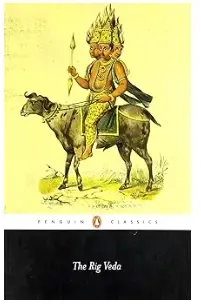
The Rig Veda is the foundation of Indian mythology. One of the most revered and ancient writings ever written, The Rig Veda, a collection of songs honouring the gods, the cosmos, and the natural world, was written in Sanskrit.
Wendy Doniger's Rig Veda is the ideal starting place for readers who desire to investigate spiritual insights and ancient wisdom as well as the spiritual world. The book sheds light on the mythology, religion, and culture of the ancient Indians. The hymns centre on themes of creation, sacrifice, death, women, the sacred plant Soma, and gods. The 108 hymns included in the book were picked for their eloquence and wisdom.
The book is motivating and offers an intriguing introduction to one of the key Hindu scriptures, as well as to the magnificent and prehistoric world of Vedic ritual, philosophy, prayer, legend, and faith.
The Ramayana translated by Bibek Debroy
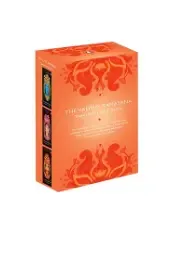
The Ramayana is the most widely read book on earth. The epic poem Ramayana, another pillar of Indian mythology, describes Lord Rama's journey as he seeks to rescue his wife, Sita, from the demonic ruler Ravana.
The Ramayana by Bibek Debroy expertly captures the spirit of the original Ramayana by Valmiki, giving readers a profound grasp of its epic and age-old themes of devotion, morality, and dharma.
The most popular epic in Indian mythology, the Ramayana, has been the subject of innumerable adaptations, retellings, and performances in a variety of formats. The Ramayana's lyrics contain a wealth of profound wisdom and age-old lessons, and Bibek Debroy's translation of them offers readers an incredible entry point into this universe.
The Mahabharata, translated by C. Rajagopalachari.
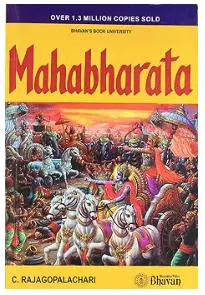
The epic battle between the Pandavas and the Kauravas is depicted in the Mahabharata, which is undoubtedly the most famous work of Indian mythology.
The Mahabharata by C. Rajagopalachari is the ideal choice for someone who wants to explore this spiritual realm. As in this book, C. Rajagopalchari has distilled the lengthy chapters into a more digestible form that captures the saga's spirit and makes for a perfect introduction to this grand story.
This book is a fantastic introduction to the vast epic Mahabharat, especially for someone entering it for the first time. However, some scholars prefer reading through a thorough edition of the Mahabharat. The Mahabharata by C. Rajagopalachari makes this epic accessible to a larger audience and enables the listener to comprehend its moral complexity, profound wisdom, and ethical problems.
Rasamandala Das' "The Complete Illustrated Guide to Hinduism"
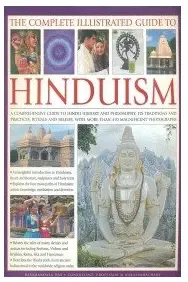
This book is a priceless tool for people who desire a thorough introduction to Hinduism and want to learn more about it. The book delves into the complex tapestry of Hindu mythology, including its gods, rituals, and philosophical ideas.
The book also provides insight into the rich tapestry of ideologies that serve as the basis for Indian mythology. In this book, the chapters explain four fundamental paths—action, knowledge, meditation, and devotion—in detail. It looks into Hindu society, culture, and the arts, as well as how many movements and leaders have attempted to uphold its precepts to the present day. Anyone who wants to learn more about the fascinating religion and culture of Hinduism will adore this book because it is thorough yet easy to read.
R.K. Narayana's book Gods, Demons, and Others
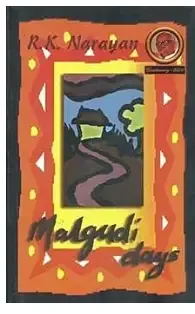
The god of storytelling, R.K. Narayana, has created incredible retellings of Indian mythology in this book. Using his signature wit and narrative flair, RK Narayana has introduced various characters, including gods, devils, people, and animals.
RK Narayan's "Gods, Demons, and Others" displays his thorough understanding of Indian mythology and culture while deftly fusing the traditional with the contemporary. The author has portrayed gods and mythical creatures with a dash of whimsy and humour to make them approachable and relevant for modern audiences.
The complex connection between myth and reality in Indian culture is illustrated in this book. The book is ideal for someone who enjoys stories and wants to learn about Indian mythology.
The Devi Bhagavatam: The Divine Stories of Goddess, translated by Swami Vijnanananda
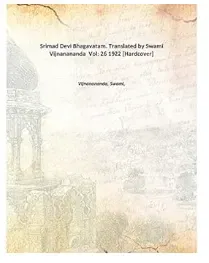
The sacred text, which is the book's focus, honours the many ways the goddess, also known as Devi, manifests herself. The translation by Swami Vijanananda thoroughly examines the mythology, symbolism, and goddess worship. The significance of feminine energy in Indian spirituality is further highlighted in the book.
The goddess is referred to as the source of power, knowledge, and protection throughout this book, and readers are urged to accept her blessings. The tales in "The Devi Bhagavatam" underline the goddess' role as the tender and protective mother of the universe and explain her furious and guarding side.
Osho's book Krishna: The Man and His Philosophy
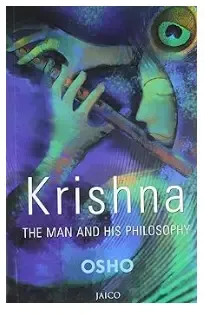
Osho is a profound and spiritual thinker who investigates the teachings of Lord Krishna, one of Hinduism's most revered deities, in this thought-provoking book. Krishna, who is regarded as Lord Vishnu in human form, is well recognised for his complex character as a divine teacher, seductive lover, kind friend, and accomplished warrior.
This book is a must-have for everyone who wants to learn more about Indian spirituality. This book is intriguing to read because Osho provides a distinctive perspective on the beloved Krishna. The book further urges readers to investigate timeless principles discovered in the life of Lord Krishna, fostering a deeper spiritual connection and a great respect for the knowledge and kindness of this deity.
Devdutt Pattanaik's book Indian Mythology: Tales, Symbols, and Rituals from the Heart of the Subcontinent
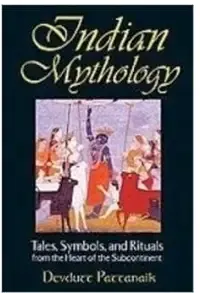
Famous novelist and mythologist Devdutt Pattanaik has provided a lovely visual and insight into Indian mythology here.
His universe decodes the cultural importance and symbolism of tales from various parts of India, giving readers a richer and better understanding of Indian mythology and culture.
The images in this book give the narratives visual depth, which helps readers better grasp the cultural importance and symbolism behind the numerous myths and rituals that people still practice and believe in today.
Ananda Lal edited The Oxford Companion to Indian Theatre.
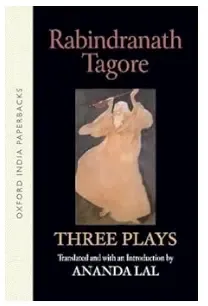
Even though this book doesn't fully describe Indian mythology, it nonetheless demonstrates how mythology has influenced Indian theatre. The book investigates how Indian mythological ideas, characters, and stories have been flawlessly woven into the fabric of Indian performing arts, demonstrating the mythology's ongoing importance in cultural expressions.
This book includes writing from specialists who are knowledgeable about Indian theatre. The papers in this book discuss a wide range of subjects, but those that describe the cultural and social importance of theatres in India are particularly noteworthy.
This book is a must-read for everyone interested in Indian performing arts. The book is a starting point for exploring Indian theatre while illuminating its cultural significance, artistic brilliance, and lasting legacy.
Devdutt Pattanaik's The Goddess in India: The Five Faces of the Eternal Feminine
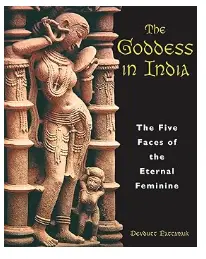
Another outstanding work by Devdutt Pattanaik is this book, which explores the complex character of the goddess in Hindu mythology. Pattanaik tries to research and illustrate the legends surrounding the numerous goddess forms in his book. The book provides a flawless understanding of the divine energy needed to understand these tales; he has further researched other ancient and local sources.
Pattanaik examines the Panch Mahadevis, a goddess with five primary manifestations in this work. These include Parvati, Kali, Lakshmi, Saraswati, and Durga. Every goddess has a different feminine energy and represents different attributes, such as nursing, protection, wealth, and education.
Shiva trilogy by Amish Tripathy( includes The Immortals of Meluha," The Secret of the Nagas," and" The Oath of the Vayuputras."
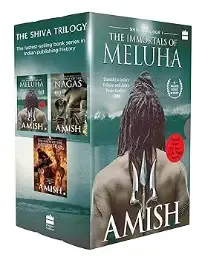
Although the Shiva trilogy by Amish Tripathi is fiction, it weaves a creative and alluring story about the life and adventures of Lord Shiva.
The trilogy presents a contemporary and exciting perspective on the revered deity, and the novel integrates elements of Indian mythology and history. Because of all of this, readers frequently choose this book.
The Shiva Trilogy weaves together mythology, history, fantasy, and fiction to craft a gripping story that has captivated people worldwide. The author's writing abilities successfully blended ancient legends with contemporary methods, giving Lord Shiva a more human quality while retaining his holy aura.
Indian mythology: An encyclopaedia of Myth and legend by Donald A. Mackenzie.
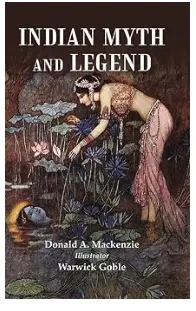
For those who are interested in Indian mythology and are aspiring scholars, this encyclopaedia is a must-have resource. The themes covered by this dictionary span from ancient myths and deities to symbols and rituals.
The encyclopaedia offers a thorough analysis of the complex world of Indian mythology. This book is an essential tool for anyone looking to learn more about the rich fabric of Indian mythology. For those who desire to dig into the world of gods, heroes, legendary beings, and so many other things that have been a part of Indian culture for millennia, it frequently serves as a guide.
The book is a thorough compendium with several distinguishing qualities, such as comprehensive treatment of many subjects, contextual insights, a scholarly approach, regional variances, images, and more.
Last words
The realm of Indian mythology is expansive and full of a wide variety of stories, deities, and age-old lessons.
There are 13 excellent books on Indian mythology that you should read if you want a taste of the country's vast cultural legacy. These works give readers a deeper comprehension of the ideas and stories influencing India's collective psyche.
The best choice for anyone looking to learn more about Indian mythology is one of these works, which range from the ancient writings of the Rig Veda, Ramayana, and Mahabharata to the perceptive interpretations of contemporary writers like Devadutt Pattnaik and R.K. Narayana.
These books are excellent resources to ensure your comprehension of Indian mythology, whether you are a scholar, an enthusiast, or simply curious to learn about these ancient tales.
Also, read the following.
A Tour Of The Best Books On Indian History.
Best Fictional books you can read this year to light up your mood.
Top 10 Books That Every College Student Should Read.
Share and subscribe to the blog by email.





